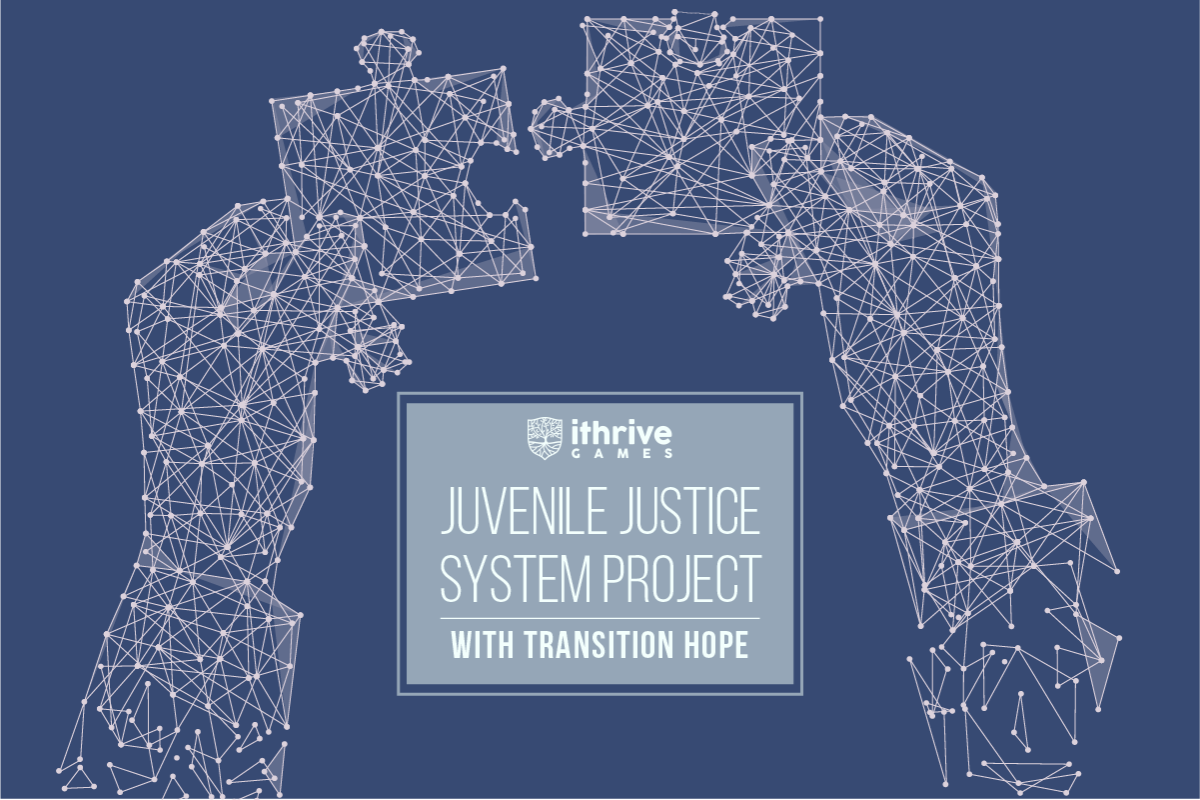
iThrive’s Juvenile Justice System Project Fosters New Partnerships
Our Juvenile Justice System Project uses game design as a tool for system-involved teens to share their stories and co-design solutions. Here’s what’s to come.
Racial disparities in the juvenile justice system continue to grow even as youth arrest rates decline overall, and black youth face particularly egregious disparities. Inequity in the provision of mental health services on the basis of race before, during, and after incarceration negatively impacts the health, well-being, employment opportunities, educational attainment, and relationships of individuals of color who are or were system-involved.
Last year, with a grant from William T. Grant Foundation, iThrive began setting the groundwork for a project to increase understanding of the lived experiences of youth of color within juvenile detention centers. The project was set to use iThrive's co-design approach, Game Design Studio, to authentically engage with youth and explore opportunities and barriers to supporting their mental health.
The COVID-19 pandemic hit just before the project was set to launch, disrupting the planned work. We could no longer work in-person with the youth; the detention centers were closed to all visitors indefinitely and travel restrictions were in place across the country. Staff explored and tested options for working with the young people at the chosen site in Georgia remotely, but the lack of reliable remote access and the nature of the work prohibited a distance approach.
After a few months of exploring other potential partners, staff found an excellent collaborator in Janelle Ridley. Bringing over 15 years of expertise to the project, Ms. Ridley currently sits on the Governor's Juvenile Justice Advisory Board and was previously a District Coordinator for System-Involved Youth for the Boston Public Schools where she worked with youth most impacted by the school-to-prison pipeline and sought to intentionally foster educational equity while actively working to dismantle the school-to-prison pipeline. Ms. Ridley is founder of Transition HOPE, a program intentionally designed for youth who are system-involved. Transition HOPE has been able to assist and bridge the needed resources for youth to continue moving forward. HOPE is an acronym for holding High Expectations for each and every young person; providing Opportunities that are realistic and within their perspective; helping the youth envision Pathways to Success by taking ownership of decisions for desired long-term outcomes; and providing Encouragement to help youth acknowledge that success is theirs to claim and define irrespective of the past.
In this new iteration of the project, iThrive staff will work closely with Ms. Ridley and a group of youth who will serve as Peer Leaders using our game design studio workshop model. Within the game design studio, peer leaders design games that draw from their lived experiences to think about the impacts of systems on their lives, and to imagine re-designed systems that would better support their well-being and mental health. In addition to designing games, peer leaders will build their facilitation skills and will lead meetings across the year with stakeholders, including other youth, city officials, educators, among others. In those meetings, peer leaders will use the games they design to launch discussions and explorations around systemic change, with particular focus on their lived experiences and on their well-being and mental health.
The peer leaders will work with youth stakeholders across multiple sessions using the game design studio approach, where the youth stakeholders will be invited to share their experiences in the system, iterate on the game designs to better reflect their needs and experiences, and then engage in conversations and game-play sessions with stakeholders.
"My goal is for those in positions of power and change to recognize that those with the lived experience are the experts, and they need to be at the forefront of change," said Ms. Ridley. "My hope is that these youth will see the value they are able to bring forth and although their journey has been those of trials, tribulations, and oppression, their journey is not over yet."
iThrive staff are grateful to Ms. Ridley and the youth for their partnership and also look forward to collaborating with AGNCY, a Boston-based nonprofit design firm that engages user-centered design to work with stakeholders toward systems change; and Beverley Evans, associate professor at the Graduate School of Education at Lesley University, who focuses much of her teacher training on building empathy amongst her students for young people and families most impacted by the school-to-prison pipeline.
"We are thrilled to have found partnerships to advance this important work," said Susan E. Rivers, PhD, Executive Director and Chief Scientist at iThrive Games. "We look forward to engaging with this group of young people in service of supporting youth-initiated systemic changes, changes that are long overdue."


